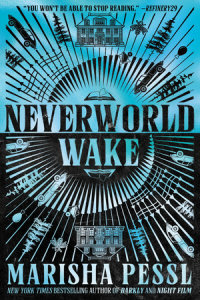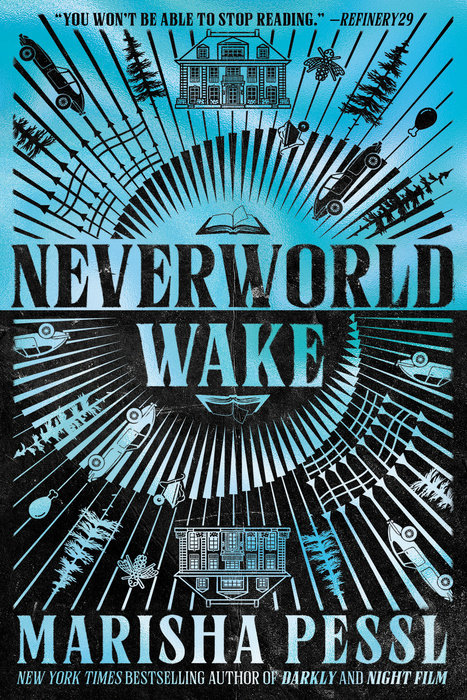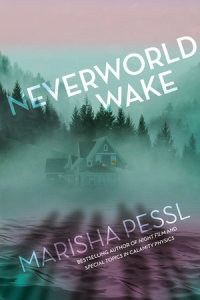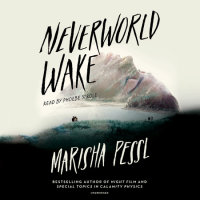Neverworld Wake
Five teens are caught in a continuous time loop where they are forced to choose who lives and who dies in this absorbing psychological thriller from the acclaimed New York Times bestselling author of Special Topics in Calamity Physics and Night Film.
"Beautifully creepy." --The New York Times
"You won't be able to stop reading." --Refinery29
"Dark and twisty." --Bustle
Five friends. Only one can survive. Who would you choose?
It's been one year since graduation, and Beatrice Hartley has mixed feelings about joining her friends a weekend reunion. She's right to be worried. After a night out, they narrowly avoid a collision with a car on a deserted road. Or so they believe...
Back at the mansion where they are staying, a mysterious man knocks on the door during a raging storm. He tells them that they must make a choice: one of them will live, and the rest will die. And the decision must be unanimous.
Soon time backbends. Beatrice and her friends are forced to repeat that dreadful day so many times they lose count. With each replay, events twist and fears come alive in horrifying ways.
To escape, they have to vote. But how do you choose who to kill? And then how do you live with yourself? This nightmare, this nothingness . . . this is the Neverworld Wake.
From critically acclaimed, literary sensation, Marisha Pessl, comes a spellbinding story that is "the kind of book you'll tear through and then want to talk about with everyone you know." (Nylon).
An Excerpt fromNeverworld Wake
I hadn’t spoken to Whitley Lansing--or any of them--in over a year.
When her text arrived after my last final, it felt inevitable, like a comet tearing through the night sky, hinting of fate.
Too long. WTF. #notcool. Sorry. My Tourette’s again. How was your freshman year? Amazing? Awful?
Seriously. We miss you.
Breaking the silence bc the gang is heading to Wincroft for my bday. The Linda will be in Mallorca & ESS Burt is getting married in St. Bart’s for the 3rd time. (Vegan yogi.) So it’s ours for the weekend. Like yesteryear.
Can you come? What do you say Bumblebee?
Carpe noctem.
Seize the night.
She was the only girl I knew who surveyed everybody like a leather-clad Dior model and rattled off Latin like it was her native language.
“How was your exam?” my mom asked when she picked me up.
“I confused Socrates with Plato and ran out of time during the essay,” I said, pulling on my seat belt.
“I’m sure you did great.” She smiled, a careful look. “Anything else we need to do?”
I shook my head.
My dad and I had already cleared out my dorm room. I’d returned my textbooks to the student union to get the 30 percent off for next year. My roommate had been a girl from New Haven named Casey who’d gone home to see her boyfriend every weekend. I’d barely seen her since orientation.
The end of my freshman year at Emerson College had just come and gone with the indifferent silence usually reserved for a going-out-of-business sale at a mini-mall.
“Something dark’s a-brewin’,” Jim would have told me.
I had no plans all summer, except to work alongside my parents at the Captain’s Crow.
The Captain’s Crow--the Crow, it’s called by locals--is the seaside cafe and ice cream parlor my family owns in Watch Hill, Rhode Island, the tiny coastal village where I grew up.
Watch Hill, Rhode Island. Population: You Know Everyone.
My great-grandfather Burn Hartley opened the parlor in 1885, when Watch Hill was little more than a craggy hamlet where whaling captains came to shake off their sea legs and hold their children for the first time before taking off again for the Atlantic’s Great Unknowns. Burn’s framed pencil portrait hangs over the entrance, revealing him to have the mad glare of some dead genius writer, or a world explorer who never came home from the Arctic. The truth is, though, he could barely read, preferred familiar faces to strange ones and dry land to the sea. All he ever did was run our little dockside restaurant his whole life, and perfect the recipe for the best clam chowder in the world.
All summer I scooped ice cream for tan teenagers in flip-flops and pastel sweaters. They came and went in big skittish groups like schools of fish. I made cheeseburgers and tuna melts, coleslaw and milk shakes. I swept away sand dusting the black-and-white-checkered floor. I threw out napkins, ketchup packets, salt packets, over‑21 wristbands, Del’s Frozen Lemonade cups, deep-sea fishing party boat brochures. I put lost cell phones beside the register so they could be easily found when the panic-stricken owners came barging inside: “I lost my . . . Oh . . . thank you, you’re the best!” I cleaned up the torn blue tickets from the 1893 saltwater carousel, located just a few doors down by the beach, which featured faded faceless mermaids to ride, not horses. Watch Hill’s greatest claim to fame was that Eleanor Roosevelt had been photographed riding a redhead with a turquoise tail sidesaddle. (It was a town joke how put out she looked in the shot, how uncomfortable and buried alive under her plate-tectonic layers of ruffled skirt.)
I cleaned the barbecue sauce off the garbage cans, the melted Wreck Rummage off the tables (Wreck Rummage was every kid’s favorite ice cream flavor, a mash‑up of cookie dough, walnuts, cake batter, and dark chocolate nuggets). I Cloroxed and Fantasticked and Mr. Cleaned the windows and counters and doorknobs. I dusted the brine off the mussels and the clams, polishing every one like a gemstone dealer obsessively inspecting emeralds. Most days I rose at five and went with my dad to pick out the day’s seafood when the fishing boats came in, inspecting crab legs and fluke, oysters and bass, running my hands over their tapping legs and claws, barnacles and iridescent bellies. I composed song lyrics for a soundtrack to a made‑up movie called Lola Anderson’s Highway Robbery, drawing words, rhymes, faces, and hands on napkins and take-out menus, tossing them in the trash before anyone saw them. I attended grief support group for adolescents at the North Stonington Community Center. There was only one other kid in attendance, a silent boy named Turks whose dad had died from ALS. After two meetings he never returned, leaving me alone with the counselor, a jittery woman named Deb who wore pantsuits and wielded a three-inch-thick book called Grief Management for Young People.
“ ‘The purpose of this exercise is to construct a positive meaning around the lost relationship,’ ” she read from chapter seven, handing me a Goodbye Letter worksheet. “ ‘On this page, write a note to your lost loved one, detailing fond memories, hopes, and any final questions.’ ”
Slapping a chewed pen that read tabeego island resorts on my desk, she left. I could hear her on the phone out in the hall, arguing with someone named Barry, asking him why he didn’t come home last night.
I drew a screeching hawk on the Goodbye Letter, with lyrics to a made‑up Japanese animated film about a forgotten thought called Lost in a Head.
Then I slipped out the fire exit and never went back.
I taught Sleepy Sam (giant yawn of a teenager from England visiting his American dad) how to make clam cakes and the perfect grilled cheese. Grill on medium, butter, four minutes a side, six slices of Vermont sharp cheddar, two of fontina. For July Fourth, he invited me to a party at a friend of a friend’s. To his shock, I actually showed. I stood by a floor lamp with a warm beer, listening to talk about guitar lessons and Zach Galifianakis, trying to find the right moment to escape.
“That, by the way, is Bee,” said Sleepy Sam. “She does actually speak, I swear.”
I didn’t mention Whitley’s text to anyone, though it was always in the back of my mind.
It was the brand-new way-too-extravagant dress I’d bought but never taken out of the bag. I just left it there in the back of my closet, folded in tissue paper with the receipt, the tags still on, with intention of returning it.
Yet there was still the remote possibility I’d find the courage to put it on.
I knew the weekend of her birthday like I knew my own: August 30.
It was a Friday. The big event of the day had been the appearance of a stray dog wandering Main Street. It had no tags and the haunted look of a prisoner of war. He was gray, shaggy, and startled with every attempt to pet him. A honk sent him skidding into the garbage cans behind the Captain’s Crow.
“See that yellow salt-bed mud on his back paws? That’s from the west side of Nickybogg Creek,” announced Officer Locke, thrilled to have a mystery on his hands, his first of the year.
That stray dog had been the talk all that day--what to do with him, where he’d been--and it was only much later that I found my mind going back to that dog drifting into town out of the blue. I wondered if he was some kind of sign, a warning that something terrible was coming, that I should not take the much-exalted and mysterious Road Less Traveled, but the one well trod, wide-open, and brightly lit, the road I knew.
By then it was too late. The sun had set. Sleepy Sam was gone. I’d overturned the cafe chairs and put them on the tables. I’d hauled out the trash. And anyway, that flew in the face of human nature. No one ever heeded a warning sign when it came.



